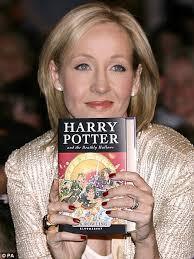Prasenjeet Kumar's Blog, page 4
August 22, 2015
Don’t Give up Too Soon!
 A few days back, one of my friends forwarded a very touching story that I thought should share with you today.
A few days back, one of my friends forwarded a very touching story that I thought should share with you today.
No matter how talented or capable you are, a time always comes in life where you feel hopeless and think that you are good for nothing.
But wait….
May be you were born to do something different and make a different kind of impact to your as well as the life of others.
So let me tell you this story….
Once there was a man who dropped out of university. Later on, he got married and worked as a teacher in a primary school. The man was shy and had difficulty asserting himself. And due to his relative lack of experience, he was troubled and harassed by tougher students.
In less than a week, after not being able to discipline the students, the man decided to quit and returned home quite dejected. His wife wiped his tears comforting him with the words:
‘You should not be too sad about it. Probably there is a more suitable job waiting for you out there.’
The man gaining some strength from his wife’s words tried to search for another job and managed to find one. But this time, he was fired because his employer thought he was too slow to keep pace with his other colleagues.
Shattered, he came back and told his wife that he was good for nothing. In school, he was harassed by students. In this job, his other colleagues seemed to be more competent than him.
This time, his wife commented:
‘There are always people who are skilful and non-skilful. Some have experience from their years of work. As for you, you were in school all this while. So, how could you acquire these needed skills?’
Re-assured, the man kept applying for numerous openings but could never stay for long in any job. Each time, he returned dejected, his wife would comfort him and never told him that she was disappointed or resentful.
The man was in his thirties when he acquired a flair in languages. He became a counsellor in a school for the deaf and mute. Later on, he opened a school for the disabled. A few years later, he set up chain stores in different cities and provinces selling apparatus & equipment for the disabled. Soon he became a multi-millionaire in a sector which no one knew that it existed.
The man was John Doe!
One day Doe asked his wife. ‘When everything was looking bleak, how did you have so much faith in me?’
His wife gave him a very simple reply.
 She said, ‘When a piece of land is not suitable for planting wheat, we could try planting beans. If the beans are not growing well, we could try planting fruits or gourds. If the vegetation is not economical, we can instead scatter buckwheat seeds. These seeds will one day bloom into flowers. On this land itself, there will be one seed that will germinate and grow.’
She said, ‘When a piece of land is not suitable for planting wheat, we could try planting beans. If the beans are not growing well, we could try planting fruits or gourds. If the vegetation is not economical, we can instead scatter buckwheat seeds. These seeds will one day bloom into flowers. On this land itself, there will be one seed that will germinate and grow.’
After having listened to the wife’s explanation, John couldn’t control his tears. His wife’s faith, love, patience, and persistence in him is likened to the one seed in the land. This is the seed that persists and creates the miracle on this piece of land.
“In this world, there’s no one person who is useless. It is just that they have not positioned themselves firmly in the right place.”
Have a nice day!
The post Don’t Give up Too Soon! appeared first on Publish With Prasen.
July 26, 2015
Over 50+ Sites to Promote Your Free & Discounted Books
There are  hundreds of sites promising to promote your books. Their business model is obviously not very robust, because I keep on finding them dropping “dead” at the drop a hat. Pixel of Ink is a recent example. Another warning. Some of these sites switch from being a Free Advertising space to becoming paid. So check very carefully before filling up their forms.
hundreds of sites promising to promote your books. Their business model is obviously not very robust, because I keep on finding them dropping “dead” at the drop a hat. Pixel of Ink is a recent example. Another warning. Some of these sites switch from being a Free Advertising space to becoming paid. So check very carefully before filling up their forms.
To be on the safe side, you could start with Author Marketing Club which in any case is a great place for indie authors to learn about book marketing. Their basic membership is FREE and you can register with them to use their site.
I have also done a review of Author Marketing Club’s Premium Membership. There is no need to spend money immediately but if you are interested in learning more, you could go to:
http://www.publishwithprasen.com/author-marketing-club-premium-membership/
Author Marketing Club features a good list of sites that will accept your books when you are running a free or discounted promotion.
You could check them out (without registering) at:
http://authormarketingclub.com/members/submit-your-book/
The sites featured here that can be tried out for your FREE books are:
* Freebooksy: for PERMAFREE too
* It’s Write Now
* Bookpraiser: for PERMAFREE too
* Free&discountedbooks: for PERMAFREE too: Need to register first.
* Kindle Book Promos
* Indie Book of the day:
* eReader Girls
* Ignite your Book
* OHFB
* Book Circle
* Ebook Stamp: Every time you wish to promote, it asks you to “update your profile!”
* The Reading Sofa
Here are a few more sites that I have compiled which you can use. Just remember to post to these sites at least 14 days in advance; otherwise many may not accept your request. Most of these sites also have a paid option but I suggest sticking to the free one. There is no need to waste money.
More Sites to Promote FREE BOOKS and PERMA FREE BOOKS
Read Freely:
http://www.readfree.ly/submityourfreebook/
Hot Zippy:
http://support.hotzippy.net/?page_id=585
Just Kindle Books:
http://www.justkindlebooks.com/submit-your-book/
Independent Author Network:
http://www.independentauthornetwork.com/free-ebooks.html
Choosy Book Worm:
Free Books Hub:
http://www.freebookshub.com/authors/
Note: This site almost immediately asks you to take their paid option! So you can avoid them.
E-Reader Utopia:
Note: Your books always remain on this site, so for future promotions you need to just update the period of your offer.
Awesome Gang:
http://awesomegang.com/submit-your-book/
Zoeys Online Books:
http://www.zoeysonlinebooks.com/free-promo/
E-Reader Perks:
http://www.ereaderperks.com/authors/
Book Canyon:
http://bookcanyon.com/submitbook/
Frugal Freebies:
http://www.frugal-freebies.com/p/submit-freebie.html
Daily Cheap Reads:
http://www.dailycheapreads.com/your-two-cents-worth
Note: You will need to send them a message! My message, for example was:
“Amazon #1 bestseller author Prasenjeet Kumar’s “Quiet Phoenix: An Introvert’s Guide to Rising in Career & Life” (Book Link: http://www.amazon.com/dp/B00KZK0N9S) is going FREE (regular price $3.99) only for five days from March 05 to 09, 2015.
In a first-of-its-kind tell-all memoir on the inside working of a top Indian law firm, corporate lawyer turned author Prasenjeet Kumar, shares his experiences in as candid and no-holds-barred manner as never disclosed in this genre before.
Like the legendary Phoenix bird rising from the ashes, “Quiet Phoenix” is a self-help manual specifically meant to encourage all introverts or Quiet persons to lift them up literally from the bootstraps, by constantly reminding them that introversion is NOT a handicap to be ashamed of. In fact, Introverts are supposed to have amazing powers of concentration, engaged listening, and an ability to foster deep relationships with friends and clients.
Over all, “Quiet Phoenix” is an incredible career change story that Prasenjeet Kumar shares, with wit and charm, of the journey from being a Corporate Lawyer to becoming a Full Time Author-Entrepreneur using his introversion as strength to overcome all obstacles”.
The Digital Ink Spot:
https://docs.google.com/spreadsheet/embeddedform?formkey=dC1PcUFvVlZiV25lcjYtZzhtNzNQQnc6MQ
Free Books Blog:
http://www.freeebooksblog.com/contact/
Note: You will need to send them a message.
Indie House Books:
http://indiehousebooks.com/about-3/#contact-form-456
Note: You will need to send them a message: They need at least one week notice prior to the free promotion date. Send them an email at staff@indiehousebooks.com with “Free eBook” in the subject line. Be sure to include the book description, the title, a link to the listing, and the date(s) of the promotion. The promotions are provided on a first-come, first-serve basis.
Book Angel:
http://bookangel.co.uk/submit-your-book/
Note: This is a British website. Send them your Amazon.co.uk book link therefore!
Click Reading:
http://clickreading.com/contact/
Note: You will need to send them a message.
Feed Your Reader:
http://www.feedyourreader.com/submit-your-book-2/
E-Free Books.org:
http://efreebooks.org/contact-us/
Note: You will need to send them a message.
Deal Seeking Mom:
http://dealseekingmom.com/about/contact/
Note: You will need to send them a message.
Penny Pinching Mom:
http://www.pennypinchinmom.com/share-your-deals-with-me/
Note: Need to send a message to tracie@pennypinchinmom.com.
Free Stuff Times:
http://www.freestufftimes.com/about-the-site
Note: Need to send a message.
Free Books For Me:
http://www.freeebooksforme.com/authors-page/
Free Books Blog:
http://www.freeebooksblog.com/contact/
I Love Ebooks:
http://www.iloveebooks.com/for-authors.html
Sites for FREE AND PERMA FREE BOOKS but with conditions
You can once again start with the Author Marketing Club at:
http://authormarketingclub.com/members/submit-your-book/& click on:
Orangeberry Free Me:
https://docs.google.com/forms/d/1L82zYr8sJBTchnUni79XcT8MH2Aw-SyBTUPmOxrPeig/viewform
Note: They will promote you only once in 90 days.
Digital Book Today:
Note: Minimum guidelines for listing free books are 18+ reviews and a rating of 4.0+ stars. If your book does not meet these guidelines, you have to pay.
The Ereader Cafe:
http://www.theereadercafe.com/p/bargain-submissions.html
Note: Needs minimum 3 reviews; for PERMAFREE too.
EBL (ebooklister.net):
Note: Needs minimum 5 reviews above 3.8
Buck Books:
http://buckbooks.net/buck-books-promotions/
Note: Needs you to promote their books as Affiliate! So you can avoid them.
Reading Deals:
http://readingdeals.com/submit-ebook/free
Note: Needs 5 reviews above 4 star; you will also need to enter a code received on email.
Your Daily Ebooks:
http://www.yourdailyebooks.com/sample-page/
Note: You will need to register and send a message to contact@YourDailyEbooks.com. They are for fiction only.
Book Preview Club:
Note: Needs you to upload preview chapters.
Sites outside the Author Marketing Club but with conditions
Read Cheaply:
http://readcheaply.com/submit/
Note: May reject if:
* At least one of your books has been listed within the last 30 days.
* The book submitted has been listed within the last 120 days.
* Your book does not have enough good reviews from verified purchases.
* Your book is not professionally edited.
* Your book is not professionally formatted.
* Your cover graphic-design quality is sub-par.
* You used an Amazon Look-inside image instead of a clean high-res image.
* The cover image you provided is poor quality, low-resolution or not at least 400px in height.
* You provided a full cover image instead of just the front cover (does not apply to boxed sets).
* You have provided non-functioning or non-US buy URLs for your book.
* The URLs you provided are shortened using Bit.ly or another URL shortner, or contain affiliate codes.
* The short description you provided is not at least 200 characters, or is poorly written, or lacks appeal.
* The category you have selected is not appropriate for your book.
Fussy Librarian:
http://www.thefussylibrarian.com/for-authors/
Note: In order to be considered, your ebook must have 10 reviews and a 4.0 rating on Amazon OR Barnes and Noble. If you have 10 reviews split between Amazon’s various stores — like US and UK — your book is eligible. The eBook should also be priced at $5.99 or less.
If you have a new release or pre-order, it can be accepted it if you have a previously published book with more than 50 Kindle or 50 Nook reviews and a 4.0 average. The 50 reviews need to be for a single book.
Addicted to E-Books:
http://addictedtoebooks.com/content/free-advertising
Note: Needs 5 reviews.
Daily Book Worm:
http://thedailybookworm.com/submit-free-books/
Note: Needs four reviews with 3.5 or above
Great books Great Deals:
https://greatbooksgreatdeals.wufoo.com/forms/gbgd-authors/
Note: Needs 20 reviews with 4 stars!
Book Lovers Heaven:
http://bookloversheaven.com/author-information-form/
Note: Needs 10 reviews over 4 stars.
Story Finds:
https://storyfinds.com/promotions-for-authors
Note: Appears to be for fiction only; you will need to register and create an author’s page.
Midlist:
https://www.themidlist.com/submit
Note: Appears to be for fiction only; Needs 20 for discounted and 30 for FREE books. Reviews must be above 4 stars.
Kindle Book Review:
http://www.jotformpro.com/form/21078469493969
Note: Needs 14 days notice and 3.5 star reviews
Mom Junky:
http://www.momjunky.com/submissions-for-free-kindle-books/
Note: This site is only for genres relating to parenting, babies, recipes, etc.
Sites Where You Can Submit $0.99 and Discounted Books
You can again do well to start with the Author Marketing Club at:
http://authormarketingclub.com/members/submit-your-book/& click on:
* Bargainbooksy
* Bookpraiser
* Free&discountedbooks
* Kindle Book Promos
* Book Goodies
* OHFB
Sites outside the Author Marketing Club
Click Reading:
http://clickreading.com/contact/
Deal Seeking Mom:
http://dealseekingmom.com/about/contact/
Read Freely:
http://www.readfree.ly/submityourfreebook/
Hot Zippy:
http://support.hotzippy.net/?page_id=585
Independent Author Network:
http://www.independentauthornetwork.com/free-ebooks.html
Choosy Bookworm:
http://authors.choosybookworm.com/newsletter-and-website-feature/
Ereader Utopia:
Note: Your books always remain on this site, so for future promotions you can just update the period of your offer.
BK Nights on Fiverr.com:
Note: This is paid advertising and costs $5. I am mentioning it because these guys are very ethical and promptly refund your money on their own if you did not get enough sales to recover the cost of $5. There is no harm in trying them out, therefore.
Here is the link:
Sites to Promote Your $0.99 Books BUT With Conditions
You can again do well to start with the Author Marketing Club at
http://authormarketingclub.com/members/submit-your-book/& click on:
Ereader Cafe:
http://www.theereadercafe.com/p/bargain-submissions.html
Note: Needs minimum 3 reviews
EBL (ebooklister.net):
Note: They email a confirmation link; needs minimum 5 reviews above 3.8.
Just Kindle Ebooks:
http://www.justkindlebooks.com/submit-your-book/
Note: Needs a unique 50+ word description that appears nowhere online.
Orangeberry Free Me:
https://docs.google.com/forms/d/1OVJSChrZ9g2JCoZigGk018hYNb-R2OgNRVgez_eKvEQ/viewform
Note: Needs minimum 4 reviews; and allows only one FREE submission per author in 90 days.
Sites outside the Author Marketing Club BUT with conditions
Read Cheaply:
http://readcheaply.com/submit/
May reject if:
* At least one of your books has been listed within the last 30 days.
* The book submitted has been listed within the last 120 days.
* Your book does not have enough good reviews from verified purchases.
* Your book is not professionally edited.
* Your book is not professionally formatted.
* Your cover graphic-design quality is sub-par.
* You used an Amazon Look-inside image instead of a clean high-res image.
* The cover image you provided is poor quality, low-resolution or not at least 400px in height.
* You provided a full cover image instead of just the front cover (does not apply to boxed sets).
* You have provided non-functioning or non-US buy URLs for your book.
* The URLs you provided are shortened using Bit.ly or another URL shortner, or contain affiliate codes.
* The short description you provided is not at least 200 characters, or is poorly written, or lacks appeal.
* The category you have selected is not appropriate for your book.
Fussy Librarian:
http://www.thefussylibrarian.com/for-authors/
Note: In order to be considered, your ebook must have 10 reviews and a 4.0 rating on Amazon OR on Barnes and Noble. If you have 10 reviews split between Amazon’s various stores — like US and UK — your book is eligible. The eBook should also be priced at $5.99 or less.
If you have a new release or pre-order, it can be accepted it if you have a previously published book with more than 50 Kindle or 50 Nook reviews and a 4.0 average. The 50 reviews need to be for a single book.
Great Books Great Deals:
https://greatbooksgreatdeals.wufoo.com/forms/gbgd-authors/
Note: Needs 20 reviews with 4 stars!
Book Lovers Heaven:
http://bookloversheaven.com/author-information-form/
Note: Needs 10 reviews over 4 stars
Story Finds:
https://storyfinds.com/promotions-for-authors
Note: Appears to be for fiction only; you will need to register and create an author’s page.
Mid List:
https://www.themidlist.com/submit
Note: Needs 20 reviews for discounted books.
I hope you find the list useful. Feel free to give more suggestions. And don’t forget to bookmark the page for future reference. 
The post Over 50+ Sites to Promote Your Free & Discounted Books appeared first on Publish With Prasen.
July 5, 2015
How to Make a Living from Your Writing
“We’re living in the best time ever to make a living with your writing!”
So begins Joanna Penn in her latest book “How to Make a Living with Your Writing: Books, Blogging and More.”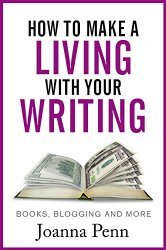

This assertion from a NY Times and USA Today Best Selling Author, who has done this and been there in the Self-publishing world, is really reassuring. Especially to the many newbie, struggling writers who doubt if it would ever be possible for them to make a full-time living from their writing.
May be we internalise whatever the society or community enamoured with “well-paying” day jobs has been telling us. May be there are too many roadblocks or challenges to be countered when writers start from scratch with a zero fan base. May be they find it daunting that there are already millions of books available on Amazon and every day a thousand more are being added.
How then can you even get noticed? This is a very legitimate question that every overwhelmed new author is entitled to ask.
Well here then comes a truly refreshing and enlightening book from Joanna Penn that should clear all such misconceptions immediately. Not only does she motivate you to pursue your dreams and not to listen to critics and your so called well-wishers but she also comes up with practical, actionable steps that can make you realise your author-entrepreneurial dreams pretty soon.

There is always hope.
Image Courtesy of arztsamui/FreeDigitalPhotos.net
Joanna forces you to think of opportunities instead of challenges. For example, don’t think of your book as only one manuscript or as a one-time income source (like a speaking or consulting assignment) but as one which is scalable over time. One book on one e-book retailer and in one format (say Kindle edition) is one stream of income. But the same book in different formats (audio, print and translations) on different e-book retailers (such as Apple, Kobo, Nook, Google Play) can yield multiple streams of income. If you worry about your Kindle sales plateauing in the US, think about the other territories elsewhere in the world, especially on mobile phones, that have just started to open up to digital book sales. After all English is a global language and your audience too is global. You would be doing a great disservice to yourself and to your writing career if you are not thinking beyond sales in the US.
Okay, enough of motivational talk. Joanna comes up with various actionable plans that can help you achieve your goals. The book is divided into two parts where the first part talks about making sales from your books. This involves writing more books, writing in a series, writing in different genres and of different length and exploiting various rights such as Audio, Print, and e-Book formats.
The second part talks about earning from various other streams such as blogging, creating Udemy courses, public speaking, consultation, coaching and freelance writing. You really don’t need to blog in order to make a living, assures Joanna. But if you want to, your blog too can become a new stream of income with advertisements, endorsements and affiliate income.

It is possible to have multiple streams of income.
Image Courtesy of Keattikorn/FreeDigitalPhotos.net
If you are doing everything and wondering whether you will ever be able to make a full time living, Joanna has got some fantastic advice to offer. She says if you can make $10 worth of sales, you have the potential to graduate to making $100 and from there to $1000, $10,000 and $100,000. Joanna herself claims to be earning a six-figure income by now.
Sure, you will make plenty of mistakes on the way and many of your bets will go awry. Joanna too with refreshing candour mentions the many she had made. For example, how she once started six blogs and now continues with just two. Or, how overestimating her skills in selling her books to local booksellers, she ordered thousands of paperbacks and then had to send most of them to a landfill.
Once bitten, she now only trusts the POD services (like CreateSpace, which prints-on-demand only when someone places a firm order). This is a strategy I heartily endorse and use for all my existing 12 books and five translations.
On the downside, I need to point out that Joanna does not discuss the cons of blogging and creating Udemy courses. For example, success in blogging requires traffic and if you are trying to balance your time between writing and blogging then one might suffer because of the other.
Similarly if you want to create courses, then you may have to learn how to create audio and video files. There could be a huge learning curve plus costs involved at every step. But let’s face it, these types of cons are pretty self-evident and Joanna having implemented them herself is only sharing some new ideas.
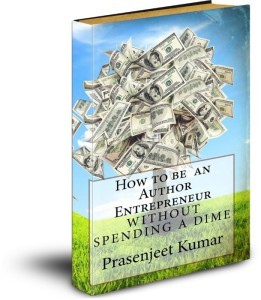 I also think that Joanna’s is a rather “high-cost” model of operation, which may NOT suit authors operating from the developing world or who don’t want to incur any financial risks. You have to purchase special software like Scrivener, buy professional cover designs and formatting templates, pay line editors, structural editors and beta readers, and then pay for advertising on platforms like Bookbub. The entire exercise, I estimate, would cost you about $1500 per book. So if you can afford it, well and good. But if you can’t, you may do well to get ideas from books like “How to be an Author-Entrepreneur WITHOUT SPENDING A DIME.” Yes, this is my book and you can grab it at no cost here. In this book, I share my own experiences about how you can publish a high quality book at $0 if you are on a shoe string budget.
I also think that Joanna’s is a rather “high-cost” model of operation, which may NOT suit authors operating from the developing world or who don’t want to incur any financial risks. You have to purchase special software like Scrivener, buy professional cover designs and formatting templates, pay line editors, structural editors and beta readers, and then pay for advertising on platforms like Bookbub. The entire exercise, I estimate, would cost you about $1500 per book. So if you can afford it, well and good. But if you can’t, you may do well to get ideas from books like “How to be an Author-Entrepreneur WITHOUT SPENDING A DIME.” Yes, this is my book and you can grab it at no cost here. In this book, I share my own experiences about how you can publish a high quality book at $0 if you are on a shoe string budget.
On the whole, How to Make a Living From Your Writing by Joanna Penn is a very uplifting book and I would highly recommend this book to any author who is making less than $500 a month or making more than $500 a month.
Do let me know what do you think of this? Do you think it is possible to make a living out of writing?
The post How to Make a Living from Your Writing appeared first on Publish With Prasen.
June 28, 2015
Babelcube is Fumbling Part-II
By the way, a few days back, I had e-mailed Mark Dresdner again sharing the link to the blog post. A few days later, his assistant replied. The reply was not convincing to me but anyway I have reproduced the copy below.
“Hi Prasenjeet Kumar,
Thank you for your message. First of all, I apologise in the name of Mark and the whole company for the delay. There has been a change in the person who primarily deals with this kind of issues, and apparently your message got lost in the wrong mailbox.
Regarding your problem, it has a solution. Regularly, the Babelcube system automatically creates a TOC for all books, so there is no need that you create your own one. However, it is always highly advisable to review the contents of the books once they get formatted and before letting them out to be published, in order to check if there are any kind of formatting errors. In this case, you can either try to change them from the original word file, or, more advisable, try to correct them with a program that allows you to edit ebooks.
The same happens in the case of Paperback versions. You should always review the final version, in order to detect any kind of error the file might content before it is out to the market. If there is any error that you are not able to solve by yourself, you can always contact us and we’ll try to provide you some guide and suggestions that will help you to correct the possible errors.
However, even in the case that a book went out with any error, you can always republish it, by clicking the “republish” button. The procedure you’ll have to follow is the same as for the first publishing, and the new version of the book will replace the ones that are available in the plattform.
Hope you find my reply useful, please feel free to contact me in case you have any further question.
Cheers,
María”

Image Courtesy of Stuart Miles/FreeDigitalPhotos.net
This is my reply below:
“Hi Maria,
Many thanks for your detailed response.
If you recall, my question was as to why Babelcube automatically inserts a Table of Contents in e-books in addition to the TOCs that these books already contain? To this, your answer indicates that this feature is meant to help authors who may not be that familiar with e-book formatting, to generally not make their lives unnecessarily complicated, etc. And the solution you suggest is that we don’t include a TOC at all!
This won’t do. Because I notice that the automated Table of Contents that Babelcube inserts is less detailed than the ones I create. Sometimes the automated TOC is incomplete mentioning only the chapter sub-headings and NOT the main headings even when the document is properly formatted with headings 1, 2 and 3. So obviously there is a bug with the Babelcube system somewhere.
The obvious solution is then to let authors use the TOC that they create but the Babelcube system, as you indicate, does not leave them with this option. This, I think, is because Babelcube uses the Draft2digital software, which incidentally I also use. But for my English books, the D2D software always gives me an option to incorporate an automated TOC or to use the one that I created and I always go with the latter option. Why can that be not done with my translated books, was my question.
And you can answer this only after you get a suitable response from D2D in this regard.
There is another issue regarding pricing. Babelcube asks you to input only one price for all platforms. This works alright for all platforms except Google, because Google Play discounts whatever price you enter at least by a dollar. This means if I enter $2.99 as a price, Google Play will make it $1.99. This also means that I, my translator and Babelcube all earn less on Google. There is also a danger of other platforms (like Amazon) “price matching” Google, which will then be a catastrophe!

Image Courtesy of Boykung/Free Digital Photos.net
For my English language books, 10 of which are on Google Play, I solve this “problem” by making my price as $3.99 and then let Google bring that down to $2.99. So may I request you to similarly raise the price on Google leaving the price at other platforms as it is? There is an excellent table at http://www.kboards.com/index.php/topic,167655.0.html that I use and you also can for achieving this price parity.
Shall really appreciate if you could help with both these problems.
Regards,
Prasenjeet”
I’ll keep you posted whenever the reply comes. Till then feel free to share this on social media with your friends or let me know your views.
The post Babelcube is Fumbling Part-II appeared first on Publish With Prasen.
May 31, 2015
Babelcube is fumbling!
Let me admit it.
I have been an unabashed fan of Babelcube for quite some time. On 25 January 2015, I first shared my first impressions openly on this blog titled “Translate your books without spending a dime: the Babelcube way”.
Three months later, I was elaborating upon the whole translation market through my second book in the “Without Spending A Dime” series called “How to Translate Your Books WITHOUT SPENDING A DIME.” Published on all major e-Book platforms in April 2015, this 102-page tome devotes almost 30 pages discussing the strategy to get your books translated and marketed by Babelcube.
Sure, I have had reasons to be pleased with Babelcube. Within a year of opening my account with them, I had two of my books (“How to Cook in a Jiffy” and “Healthy Cooking in a Jiffy”) translated into Portuguese, and one book (“Home Style Indian Cooking in a Jiffy”) translated into Italian and Spanish. Seven more titles are currently being translated, while I’m in the process of signing three more contracts. The languages covered are: French, German, Italian, Japanese, Portuguese, Spanish, and Turkish.
Sales are trickling in and I have been quite pleased with the results obtained specially on Google Play, Scribd and Apple where my translated books are beating my English language sales hollow. In fact, this experience has been so exhilarating that I have now decided to get out wholesale from KDP Select and go out to all other major e-book platforms like Apple, Barnes & Noble, Google Play, Kobo, Scribd, and Tolino.
From the time I joined Babelcube, I have been seeing subtle improvements. Earlier they couldn’t handle paperback versions, for example, but now they can.
Only last week, they have added a new feature in which you, the author, can see their entire translator data base, language-wise, and contact the translators you prefer directly. This is great because earlier you could only add your books and wait till some translator contacted you but not the other way around. I have immediately taken advantage of this new feature to find translators in French, German and Japanese, and in just three days!
So where is Babelcube fumbling?
The first instance was when my Italian translator (for my book ‘Home Style Indian Cooking In A Jiffy’) pointed out that the TOC (Table of Contents) was repeated TWICE in all the published versions on all e-Book platforms.
Twice? I was aghast. The translator hadn’t done that, nor did I. So obviously, Babelcube was inserting a table of content in addition to the one made by us (and that too an incomplete one).
I realized that this is a bug with the Draft2Digital software which I also use (for my English language books) and where you have to check boxes to indicate if you want Draft2Digital to insert a Title Page, the Copyright page or the Table of Contents. For my English language books, I do all these myself and so leave the boxes unchecked. But for the translated books, Draft2Digital apparently doesn’t care if you (or Babelcube in this case) have checked those boxes or not.
This was serious and had affected all four of my translated books. So I wrote to Mark Dresdner CEO Babelcube on 25 April 2015 to please get this sorted out soon. There has been NO reply till date!
The second problem was that the paperback version was merely repeating all these formatting errors. This was intolerable because these versions cost three times more, on an average, than the e-Book versions. In fact, the TOC that goes into paperbacks should carry real page numbers (which the e-Book formats don’t need to as they have a clickable TOCs). So ideally, the Babelcube system shouldn’t offer to convert your translated e-Books in to paperbacks and in fact should refuse them till they are properly formatted for the latter version.
Again, I complained to Mark Dresdner on 25 April 2015 but to no avail.
Pending the system-corrections, I requested Babelcube to unpublish my translated paperbacks immediately. But even that they have NOT been able to do.
So obviously Babelcube is fumbling. They are probably becoming too big and too busy too soon to take these small remedial steps that are so necessary for salvaging theirs as well as ours reputation.
So for the sake of all us poor authors and translators I just wait, wringing my hands, and praying and hoping that Babelcube recovers and GETS WELL SOON.
However, I shall NOT be publishing any more translated paperback versions of my books till then.
Has your experience with Babelcube been any better?
Do share your favourite tips and impressions.
I’ll love to hear from you.
The post Babelcube is fumbling! appeared first on Publish With Prasen.
May 24, 2015
You Become What You Believe You Are
“What do you want to do in life?”
“What is the meaning of life?”
“What is the purpose of our existence?”
These may sound like a set of perfect questions for a Philosophy student. But most of us fumble and flounder when it comes to answering these questions.
A few years back I had opted for a career in corporate law. “This is where the money is…” I was told and there was no reason not to believe that notion.
One fine morning, frustrated, confused and clueless about my life, I happened to read a story on the internet.
Let me share that story with you….
Once upon a time, at a large mountainside there was an eagle nest with 4 large eagle eggs inside.
One day, a mild earthquake rocked the mountain causing one of the eggs to roll down to a chicken farm, located in the valley below.
The hens instinctively joined together to protect the eagle egg treating it as one of their own. Eventually, the eagle egg hatched and a beautiful eagle was born.

Image Courtesy of Scoolbell.files.wordpress.com
The mother hens raised the eagle to be a chicken. The eagle loved his home and family but it seemed his spirit cried out for something more.
One day, the eagle looked to the skies above and noticed a group of mighty eagles soaring. “Oh,” the eagle cried, “I wish I could soar like those birds.”
The chickens roared with laughter, “You cannot soar like those. You are a chicken and chickens do not soar.”
The eagle continued staring at his real family up above, dreaming that he could be like them.
Each time the eagle talked about his dreams, he was told it couldn’t be done.
“Those birds are so much like me. They look like me. The only difference is that they can fly whereas I cannot. But I haven’t tried to fly.” the eagle thought to himself.
“Why not give it a try.” The eagle muttered.
“No..No..No… It might be too dangerous. What if I fell flat on my face? I would only make a fool of myself.”
“But I want to be like those birds flying high above the ground”.
“No you can’t do this.”
“What the heck. Let me try.”
So the eagle went to an isolated place far away from his fellow chickens so that nobody could watch him. Here the eagle tried to be himself. He tried to flap his wings and indeed fell flat on his face the first time.
However the eagle persisted. There was no one to watch, so there was nothing to be embarrassed about. The eagle tried the second time with the same results. The third time, the eagle managed to make a small flight, or rather a longish jump. The fourth time, he could fly longer. And the fifth time, the eagle could fly like any other eagle.
The moral of the story: You become what you believe you are. If you ever dream to become an eagle, follow your dreams, and do not go by the words of chickens, who you would most of the time be surrounded with.
You may have heard this story before. But did you know that I changed the ending because I didn’t like it.
Here is the original ending…
Each time the eagle talked about his dreams, he was told it couldn’t be done.
That was what the eagle learned to believe. After time, the eagle stopped dreaming and continued to live his life as any other chicken.
Finally, after a long eventless life as a chicken, the eagle passed away.
Thank God I realised the end. I saw the writing on the wall and left my job as a corporate lawyer. Now I am a full time writer, sharing my thoughts that deeply influence me.
If I hadn’t done this, I won’t be writing this e-mail to you.
Make your story end like the earlier one and not as the latter.
So what do you want to be in life? And what is stopping you from achieving that?
Do let me know.
I’ll love to hear your views.
The post You Become What You Believe You Are appeared first on Publish With Prasen.
May 17, 2015
JK Rowling’s famous Harvard Speech and the Fringe Benefits of Failure
I have read or heard very few speeches in my lifetime that have moved me so much.
But J.K. Rowling’s famous speech “The Fringe Benefits of Failure, and the Importance of Imagination” delivered in Harvard University in 2008 inspired me so much as to compel me to write a full short story about her in my book “Celebrating Quiet People: Uplifting Stories for Introverts and Highly Sensitive Persons”.
If you have not read that speech, I recommend that you do so whenever you have some time. For ready reference, I am reproducing the entire text below.
You can watch the video version of the speech below:
Enjoy!
——————————————————————————————
Text as delivered follows.
Copyright of JK Rowling, June 2008
“President Faust, members of the Harvard Corporation and the Board of Overseers, members of the faculty, proud parents, and, above all, graduates.
The first thing I would like to say is ‘thank you.’ Not only has Harvard given me an extraordinary honour, but the weeks of fear and nausea I have endured at the thought of giving this commencement address have made me lose weight. A win-win situation! Now all I have to do is take deep breaths, squint at the red banners and convince myself that I am at the world’s largest Gryffindor reunion.
Delivering a commencement address is a great responsibility; or so I thought until I cast my mind back to my own graduation. The commencement speaker that day was the distinguished British philosopher Baroness Mary Warnock. Reflecting on her speech has helped me enormously in writing this one, because it turns out that I can’t remember a single word she said. This liberating discovery enables me to proceed without any fear that I might inadvertently influence you to abandon promising careers in business, the law or politics for the giddy delights of becoming a gay wizard.
You see? If all you remember in years to come is the ‘gay wizard’ joke, I’ve come out ahead of Baroness Mary Warnock. Achievable goals: the first step to self improvement.
Actually, I have wracked my mind and heart for what I ought to say to you today. I have asked myself what I wish I had known at my own graduation, and what important lessons I have learned in the 21 years that have expired between that day and this.
I have come up with two answers. On this wonderful day when we are gathered together to celebrate your academic success, I have decided to talk to you about the benefits of failure. And as you stand on the threshold of what is sometimes called ‘real life’, I want to extol the crucial importance of imagination.
These may seem quixotic or paradoxical choices, but please bear with me.
Looking back at the 21-year-old that I was at graduation, is a slightly uncomfortable experience for the 42-year-old that she has become. Half my lifetime ago, I was striking an uneasy balance between the ambition I had for myself, and what those closest to me expected of me.
I was convinced that the only thing I wanted to do, ever, was to write novels. However, my parents, both of whom came from impoverished backgrounds and neither of whom had been to college, took the view that my overactive imagination was an amusing personal quirk that would never pay a mortgage, or secure a pension. I know that the irony strikes with the force of a cartoon anvil, now.
So they hoped that I would take a vocational degree; I wanted to study English Literature. A compromise was reached that in retrospect satisfied nobody, and I went up to study Modern Languages. Hardly had my parents’ car rounded the corner at the end of the road than I ditched German and scuttled off down the Classics corridor.
I cannot remember telling my parents that I was studying Classics; they might well have found out for the first time on graduation day. Of all the subjects on this planet, I think they would have been hard put to name one less useful than Greek mythology when it came to securing the keys to an executive bathroom.
I would like to make it clear, in parenthesis, that I do not blame my parents for their point of view. There is an expiry date on blaming your parents for steering you in the wrong direction; the moment you are old enough to take the wheel, responsibility lies with you. What is more, I cannot criticise my parents for hoping that I would never experience poverty. They had been poor themselves, and I have since been poor, and I quite agree with them that it is not an ennobling experience. Poverty entails fear, and stress, and sometimes depression; it means a thousand petty humiliations and hardships. Climbing out of poverty by your own efforts, that is indeed something on which to pride yourself, but poverty itself is romanticised only by fools.
What I feared most for myself at your age was not poverty, but failure.
At your age, in spite of a distinct lack of motivation at university, where I had spent far too long in the coffee bar writing stories, and far too little time at lectures, I had a knack for passing examinations, and that, for years, had been the measure of success in my life and that of my peers.
I am not dull enough to suppose that because you are young, gifted and well-educated, you have never known hardship or heartbreak. Talent and intelligence never yet inoculated anyone against the caprice of the Fates, and I do not for a moment suppose that everyone here has enjoyed an existence of unruffled privilege and contentment.
However, the fact that you are graduating from Harvard suggests that you are not very well-acquainted with failure. You might be driven by a fear of failure quite as much as a desire for success. Indeed, your conception of failure might not be too far from the average person’s idea of success, so high have you already flown.
Ultimately, we all have to decide for ourselves what constitutes failure, but the world is quite eager to give you a set of criteria if you let it. So I think it fair to say that by any conventional measure, a mere seven years after my graduation day, I had failed on an epic scale. An exceptionally short-lived marriage had imploded, and I was jobless, a lone parent, and as poor as it is possible to be in modern Britain, without being homeless. The fears that my parents had had for me, and that I had had for myself, had both come to pass, and by every usual standard, I was the biggest failure I knew.
Now, I am not going to stand here and tell you that failure is fun. That period of my life was a dark one, and I had no idea that there was going to be what the press has since represented as a kind of fairy tale resolution. I had no idea then how far the tunnel extended, and for a long time, any light at the end of it was a hope rather than a reality.
So why do I talk about the benefits of failure? Simply because failure meant a stripping away of the inessential. I stopped pretending to myself that I was anything other than what I was, and began to direct all my energy into finishing the only work that mattered to me. Had I really succeeded at anything else, I might never have found the determination to succeed in the one arena I believed I truly belonged. I was set free, because my greatest fear had been realised, and I was still alive, and I still had a daughter whom I adored, and I had an old typewriter and a big idea. And so rock bottom became the solid foundation on which I rebuilt my life.
You might never fail on the scale I did, but some failure in life is inevitable. It is impossible to live without failing at something, unless you live so cautiously that you might as well not have lived at all – in which case, you fail by default.
Failure gave me an inner security that I had never attained by passing examinations. Failure taught me things about myself that I could have learned no other way. I discovered that I had a strong will, and more discipline than I had suspected; I also found out that I had friends whose value was truly above the price of rubies.
The knowledge that you have emerged wiser and stronger from setbacks means that you are, ever after, secure in your ability to survive. You will never truly know yourself, or the strength of your relationships, until both have been tested by adversity. Such knowledge is a true gift, for all that it is painfully won, and it has been worth more than any qualification I ever earned.
So given a Time Turner, I would tell my 21-year-old self that personal happiness lies in knowing that life is not a check-list of acquisition or achievement. Your qualifications, your CV, are not your life, though you will meet many people of my age and older who confuse the two. Life is difficult, and complicated, and beyond anyone’s total control, and the humility to know that will enable you to survive its vicissitudes.
Now you might think that I chose my second theme, the importance of imagination, because of the part it played in rebuilding my life, but that is not wholly so. Though I personally will defend the value of bedtime stories to my last gasp, I have learned to value imagination in a much broader sense. Imagination is not only the uniquely human capacity to envision that which is not, and therefore the fount of all invention and innovation. In its arguably most transformative and revelatory capacity, it is the power that enables us to empathise with humans whose experiences we have never shared.
One of the greatest formative experiences of my life preceded Harry Potter, though it informed much of what I subsequently wrote in those books. This revelation came in the form of one of my earliest day jobs. Though I was sloping off to write stories during my lunch hours, I paid the rent in my early 20s by working at the African research department at Amnesty International’s headquarters in London.
There in my little office I read hastily scribbled letters smuggled out of totalitarian regimes by men and women who were risking imprisonment to inform the outside world of what was happening to them. I saw photographs of those who had disappeared without trace, sent to Amnesty by their desperate families and friends. I read the testimony of torture victims and saw pictures of their injuries. I opened handwritten, eye-witness accounts of summary trials and executions, of kidnappings and rapes.
Many of my co-workers were ex-political prisoners, people who had been displaced from their homes, or fled into exile, because they had the temerity to speak against their governments. Visitors to our offices included those who had come to give information, or to try and find out what had happened to those they had left behind.
I shall never forget the African torture victim, a young man no older than I was at the time, who had become mentally ill after all he had endured in his homeland. He trembled uncontrollably as he spoke into a video camera about the brutality inflicted upon him. He was a foot taller than I was, and seemed as fragile as a child. I was given the job of escorting him back to the Underground Station afterwards, and this man whose life had been shattered by cruelty took my hand with exquisite courtesy, and wished me future happiness.
And as long as I live I shall remember walking along an empty corridor and suddenly hearing, from behind a closed door, a scream of pain and horror such as I have never heard since. The door opened, and the researcher poked out her head and told me to run and make a hot drink for the young man sitting with her. She had just had to give him the news that in retaliation for his own outspokenness against his country’s regime, his mother had been seized and executed.
Every day of my working week in my early 20s I was reminded how incredibly fortunate I was, to live in a country with a democratically elected government, where legal representation and a public trial were the rights of everyone.
Every day, I saw more evidence about the evils humankind will inflict on their fellow humans, to gain or maintain power. I began to have nightmares, literal nightmares, about some of the things I saw, heard, and read.
And yet I also learned more about human goodness at Amnesty International than I had ever known before.
Amnesty mobilises thousands of people who have never been tortured or imprisoned for their beliefs to act on behalf of those who have. The power of human empathy, leading to collective action, saves lives, and frees prisoners. Ordinary people, whose personal well-being and security are assured, join together in huge numbers to save people they do not know, and will never meet. My small participation in that process was one of the most humbling and inspiring experiences of my life.
Unlike any other creature on this planet, humans can learn and understand, without having experienced. They can think themselves into other people’s places.
Of course, this is a power, like my brand of fictional magic, that is morally neutral. One might use such an ability to manipulate, or control, just as much as to understand or sympathise.
And many prefer not to exercise their imaginations at all. They choose to remain comfortably within the bounds of their own experience, never troubling to wonder how it would feel to have been born other than they are. They can refuse to hear screams or to peer inside cages; they can close their minds and hearts to any suffering that does not touch them personally; they can refuse to know.
I might be tempted to envy people who can live that way, except that I do not think they have any fewer nightmares than I do. Choosing to live in narrow spaces leads to a form of mental agoraphobia, and that brings its own terrors. I think the wilfully unimaginative see more monsters. They are often more afraid.
What is more, those who choose not to empathise enable real monsters. For without ever committing an act of outright evil ourselves, we collude with it, through our own apathy.
One of the many things I learned at the end of that Classics corridor down which I ventured at the age of 18, in search of something I could not then define, was this, written by the Greek author Plutarch: What we achieve inwardly will change outer reality.
That is an astonishing statement and yet proven a thousand times every day of our lives. It expresses, in part, our inescapable connection with the outside world, the fact that we touch other people’s lives simply by existing.
But how much more are you, Harvard graduates of 2008, likely to touch other people’s lives? Your intelligence, your capacity for hard work, the education you have earned and received, give you unique status, and unique responsibilities. Even your nationality sets you apart. The great majority of you belong to the world’s only remaining superpower. The way you vote, the way you live, the way you protest, the pressure you bring to bear on your government, has an impact way beyond your borders. That is your privilege, and your burden.
If you choose to use your status and influence to raise your voice on behalf of those who have no voice; if you choose to identify not only with the powerful, but with the powerless; if you retain the ability to imagine yourself into the lives of those who do not have your advantages, then it will not only be your proud families who celebrate your existence, but thousands and millions of people whose reality you have helped change. We do not need magic to change the world, we carry all the power we need inside ourselves already: we have the power to imagine better.
I am nearly finished. I have one last hope for you, which is something that I already had at 21. The friends with whom I sat on graduation day have been my friends for life. They are my children’s godparents, the people to whom I’ve been able to turn in times of trouble, people who have been kind enough not to sue me when I took their names for Death Eaters. At our graduation we were bound by enormous affection, by our shared experience of a time that could never come again, and, of course, by the knowledge that we held certain photographic evidence that would be exceptionally valuable if any of us ran for Prime Minister.
So today, I wish you nothing better than similar friendships. And tomorrow, I hope that even if you remember not a single word of mine, you remember those of Seneca, another of those old Romans I met when I fled down the Classics corridor, in retreat from career ladders, in search of ancient wisdom:
As is a tale, so is life: not how long it is, but how good it is, is what matters.
I wish you all very good lives. Thank you very much”.
Feel free to hit the comment button if you want to share your thoughts and feelings with me. 
The post JK Rowling’s famous Harvard Speech and the Fringe Benefits of Failure appeared first on Publish With Prasen.
March 30, 2015
Why using a pen name may NOT be such a smart idea?

Image Courtesy of Graur Codrin/FreeDigitalPhotos.net
Have you ever had an urge to write in a different genre?
If so, you might have wondered at some point whether you should use a pen name or a pseudonym or as the French call it a nom de guerre.
At least the question has been swirling around my head ever since I decided to be a writer.
And the most important part of the question in your mind would then be as to whether using a pen name is a good idea or not.
In this post, I will show you many reasons as to why using a pen name is such a bad idea. Of course, if you have already been using pen names, I suggest you to stick with those names but please do not create any more.
But before we talk about why using a pen name is a bad idea, we will first analyse why authors use pen names.
So why do authors use pen names?
Authors have been using pen names since time immemorial. It has often been rumoured that Shakespeare too was a pen name (whether this is fact or fiction we don’t really know for sure). The reasons are many.
Brand Confusion
Many Authors are very versatile writers and do not wish to be tied down to one genre. But if they use the same name in all those genres, they fear that this may lead to, what is known in the advertising world as, “brand confusion”. If your brand for a soda drink becomes popular, would you use it to market a laundry detergent? Never.
In the writing world, this means that if readers find out that you love writing dark fiction, travel memoirs, tips on writing and children’s books, they will not see you as an authority on anything. Therefore, some authors think it a good idea to have a separate persona for each genre.
Hiding your true identity
Many authors want to hide their gender, ethnicity or sexuality for a variety of reasons. You may still have a day job and do not want your bosses and colleagues to know that you write in your spare time.
You may be a woman author who wants to write in a genre dominated by males (i.e. war novels or dark crime fiction) and you fear that readers will not “trust” your real name because that genre has to be “male dominated” and that your readers are mostly “male chauvinists”.
Similarly some authors may want to hide their race or ethnicity because they have been told that most readers on the American site of Amazon will not read your book if they don’t see an American sounding name on it; because they are so “racist”.
Writing in an embarrassing Genre
This applies to authors writing in the erotica genre. A professor teaching literature at Harvard University might fear what her students are going to think of her if they find out she writes hot steamy erotica novels. It makes sense then for such authors to use pen names to hide their true identities.
Why then using a pen name may NOT now be such a smart idea?
Building Your Brand from Scratch
Do you love starting from scratch over and over again? At least I don’t. But if you are using a pen name, this is precisely what you will be doing.
 Let’s take J.K. Rowling’s famous example. She was already an established author with a billion dollar brand (Harry Potter) before she had an urge to write crime fiction. She too feared that her readers might be disappointed if they learnt that their star author was writing crime fiction for adults and not books on wizardry for children. So, she wrote her first crime fiction novel, The Cuckoo’s Calling under the name of Robert Galbraith.
Let’s take J.K. Rowling’s famous example. She was already an established author with a billion dollar brand (Harry Potter) before she had an urge to write crime fiction. She too feared that her readers might be disappointed if they learnt that their star author was writing crime fiction for adults and not books on wizardry for children. So, she wrote her first crime fiction novel, The Cuckoo’s Calling under the name of Robert Galbraith.
If you google search Robert Galbraith, this is what Wikipedia has to say about him (oops her):
“Before Rowling’s identity as the book’s author was revealed, 1,500 copies of the printed book had been sold since its release in April 2013, plus another 7,000 copies of the ebook, audiobook, and library editions. The book surged from 4,709th to the 1st best-selling novel on Amazon after it was revealed on 14 July 2013 that the book was written by Rowling under the pseudonym “Robert Galbraith”. Signed copies of the first edition are selling for as high as $4,000–$6,000”.
So it is clear that Robert Galbraith wasn’t selling well (because nobody knew who “he” was) until it was revealed that the author was actually J.K. Rowling. “J.K. Rowling” was already an established billion dollar brand, a brand which the author had worked so hard in building up for years. She failed to capitalise the power of the “J.K. Rowling” brand when she started writing as “Robert Galbraith”. Robert Galbraith then was choosing to start from scratch. 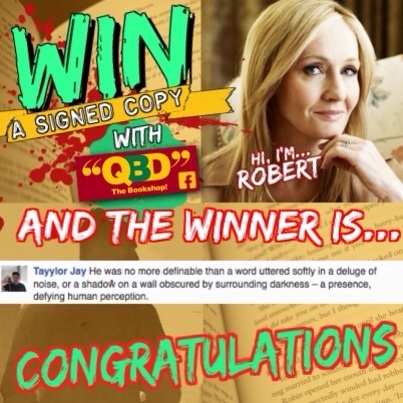
Contrary to popular wisdom, her readers didn’t mind in the least that she was writing crime fiction for adults. In fact, many of them would have bought her books just in curiosity only to be pleasantly surprised that she is indeed a very versatile writer who could easily switch from writing a Harry Potter type of magical book to a dark crime fiction novel for adults without any supernatural forces. To them, it didn’t sound that bad at all.
I think J.K. Rowling made a multi-million dollar mistake by not writing as J.K. Rowling. Now, she has started writing fiction novels for adults under her ‘J.K. Rowling’ brand like her book ‘The Causal Vacancy’.
Okay, most of us are far from being J.K. Rowling but the same logic applies. If you have already written a few books under a name, it would be extremely difficult to write books under another name. And the Internet has added to the problem, a point which I must discuss now.
Marketing Fragmentation
Authors these days use Internet marketing techniques since most of us sell books online. The online world, however, has added its own kind of challenges for authors who use pen names. For example:

Image Courtesy of Smarnad/FreeDigitalPhotos.net
Do you start a new blog for your pen name? If so, how will you drive traffic? And will it be feasible to maintain more than one such blog?
Do you open a new social media account for your pen name?
Do you build your following from scratch for each psedonym?
If you are posting about your book on Facebook or Twitter, should you use your real name or your pen name?
Should you use your photo when you are using your pen name?
Would you ever be participating in book signing ceremonies, writers’ conferences, press interviews, etc where you have to be physically present?
My own take
I own three brands so far. The first one is Cooking In A Jiffy where I write and compile cookbooks based on the Home-Style” recipes of my dear mom.
The second brand is Quiet Phoenix where I write uplifting books for Introverts and Highly Sensitive Persons (being an Introvert myself). The theme of the series is that just as the Phoenix bird has the potential to be reborn literally from the ashes, so do introverts have the power to rise from any difficult situation.
The third one is Publish With Prasen (this blog) where I share tips on writing and self-publishing.
Yet I write under my real name which is Prasenjeet Kumar and not anything else.
Last year when I was thinking of writing in the Quiet Phoenix series, I too thought of writing under a pen name. But I soon gave up the idea. Why? Because I saw the difficulties that the Internet threw at me.
I had, for example, worked hard to create an Author’s account on Goodreads. I had uploaded my photo, bio, blog, reviewed and rated around 60 books and made a few friends. I was also running giveaways. This is one of the reasons why my Goodreads account looks authentic as if someone real has been reading and reviewing books and engaging with people with a profile picture.
I did not want to create a separate account on Goodreads and start all over again. I could have easily created a dummy account without any picture, books or friends, as some authors have done, but that only does a disservice to your brand and makes you look spammy in the worst case scenario and unprofessional at best.
Whenever I run a promotion, I always post as “Prasenjeet Kumar” on Facebook and Twitter. If I started using some pen name, this would mean that I will have to open separate accounts on Facebook and Twitter. Facebook could be a problem because they only allow you to open one profile.
Not Hiding my Ethnicity

Image Courtesy of Imagerymajestic/FreeDigitalPhotos.net
I have debated with myself on many occasions whether my name may put off people on Amazon.com because it does not sound American. So far I have had no reason to doubt that. Most of my sales come from the American site of Amazon and most reviews I get are pretty positive, except for one reviewer who presumed that my native language couldn’t be English simply because I lived in India. Just to clarify, my native language is English and since my childhood I had been brought up and educated in an English medium school. In fact my command over English language is better than my native language Hindi which may surprise many.
Anyway, that is not really my point. My ideal reader is someone who loves what I write and does not care whether my name is “Kumar”, “Khan” or “King”. My ideal reader shares a strong emotional bond with me. Anyone who is put off by my name cannot be my reader and I find no reason to please such people.
What is your take on pen names? Have you used any? Do you find it useful? What difficulties have you encountered while using pen names?
I would love to hear your views on this.
The post appeared first on Publish With Prasen.
March 15, 2015
Dealing With Criticism-the Dan Brown Way
Every creative person—writer, artist, singer or actor—cringes while facing critics and the looming tsunami from their poisoned tongues and quills. Who likes being judged after all?
The sad truth, however, is that you are being judged, dissected, evaluated and scrutinized, all the while.
Remember that school teacher who told you in Grade I that your writing was terrible?
Or, that sports coach who called you too short (at age 9) to ever be a great basketball player?
Or, that next door neighbour who “advised” your parents to do something about your “shyness”?
Or, that bully in school who called you a weakling and a sissy?
We writers are especially sensitive to criticism and on many occasions take things too personally. Some lose confidence if they don’t get a publishing deal even after sending 30 proposals. They conclude that they are not good enough and go back to their day jobs.
And when we are published, and some readers tell us that this is the worst book they have ever read, many of us think of packing away our writing paraphernalia and quit writing altogether.
This is where I find Dan Brown so reassuring. I have been a great fan of Dan Brown’s novel for quite some time now. Some friends think that is an indication of how “pedestrian” my tastes are.
But seriously, I do think that Dan Brown is a great storyteller. I don’t really care whether his books represent fact or fiction. But that they entertain me and take me to absolutely another world is enough for me.
Recently Dan Brown visited India. Nearly a thousand people, both men and women, old and the young, came to listen to him. Dan Brown spoke about religion and science and all kinds of interesting stuff. The audience was curious to know about Dan Brown’s next novel and whether Robert Langdon would ever visit India.
Everything was hunky dory till the presenter Rajdeep Sardesai, one of the most eminent TV journalists of India, took out a piece of paper. That paper contained all the negative things written or said about the Da Vinci Code by famous people. It looked like that Rajdeep wanted to pull Dan Brown’s leg and see his reaction in front of a thousand people.
Rajdeep started with Salman Rushdie’s famous quote on the Da Vinci Code. He read out loudly:
“Do not start me on The Da Vinci Code … a novel so bad that it gives bad novels a bad name.”
(Discussion at Woodruff Auditorium in Lawrence, KS; October 7, 2005)”
“How would you feel if you had written that book? “
“Awful, Sad…”
Rajdeep Sardesai did not stop at that. He asked Dan Brown’s opinion of Mr. Salman Rushdie’s quote.
“He is a nice man,” Dan Brown replied without batting an eyelid.
And that was it. The audience was floored. People started cheering and clapping loudly. Dan Brown looked extremely relaxed. It didn’t look like he had been hurt. Rajdeep Sardesai appeared a little disappointed with Dan Brown’s reaction. There was no thrill in whatever Dan Brown said.
Writing is like cooking, Dan Brown continued. A chef prepares a soufflé to his taste. Not everyone is going to like his soufflé except those who share the chef’s taste. Similarly, I wrote a novel to my taste. Not everyone is going to like what I write. But those who share my taste, become my fans.
This is what makes Dan Brown a true rock star!
This reminded me of a comment from one of my reviewers on Library Thing who said that I bash my former work colleagues too much in my book Quiet Phoenix: An Introvert’s Guide to Rising in Career & Life.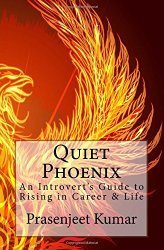

Certainly, my reviewers are all very “nice people.” But if I am talking about how introverts can survive bosses blatantly practicing favouritism and colleagues who regularly steal ideas and backstab you, you cannot expect me to say very nice things about such people. You are not supposed to be polite when you are writing a book about office politics. Surely my former office colleagues are wonderful people in their personal lives. They were all very friendly, understanding and approachable. It is a sad thing that the cut throat competition of the workplace makes ordinary people do extra-ordinarily horrible things.
For that reason, I don’t blame them at a personal level. In fact, I forgive all of them by the end of the book, because I have really moved on.
I also understand that my book will not appeal to everyone just as a soufflé is not everyone’s cup of tea. A book that teaches women to stand up against their abusive husbands will not appeal to those who practice and perpetrate domestic violence. But you don’t expect an author to say that women should not question their husbands simply because the society expects them to do so, do you?
It is the same logic that applies to my book. I can’t say that I worked with great colleagues or team players when actually I didn’t. Also when the purpose of my book is to teach introverts how to deal with bad bosses and office colleagues, I will be dishonest if I brushed under the carpet all such instances of bad behaviour.
Conclusion: If you have to achieve anything in life, stop listening to people who call themselves critics. In the writing world, there is a common saying that those who do not have the guts to write a single word become critics. I’m sure this would be true about many other professions.
Remember, those who can, do. Those who can’t, criticise.
Have a great weekend!
Prasenjeet Kumar
The post Dealing With Criticism-the Dan Brown Way appeared first on Publish With Prasen.
February 28, 2015
Taking One-Hundred Percent Responsibility for Your Life

Image Courtesy of Stuart Miles/FreeDigitalPhotos.net
I love reading motivational books. Lately every book I read has been advising me to change my response to an outcome.
The constant refrain is that it is not the failure or disappointment that should matter, but how we react to it!
Sounds very intriguingly profound, isn’t it? But when I casually mentioned the thought in a social get-together, some sniggered calling it pure rubbish—easy to say, but difficult to achieve.
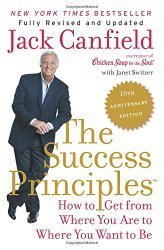

That took me to August 2014, when I had first read Jack Canfield’s Principles of Success. Jack talks about taking 100% responsibility for your life. He gives the example of the great earthquake that almost devastated Los Angeles in 1994. The earthquake had damaged one of the main freeways leading into the city resulting in massive traffic snarls. A CNN Reporter, who was similarly stuck, got out from his car and went knocking from car to car, asking the drivers how they were doing.
The first responded angrily saying that Los Angeles is a horrible place to live in. There are floods, fires and earthquakes. No matter how early he started, he would never reach on time.
The CNN Reporter asked the same question to another driver. This gentleman responded by saying that he does not see being stuck as much of a problem.
Really, the reporter was flabbergasted.
The gent explained that he leaves for work at 5 a.m. But he always carries lots of music cassettes and Spanish language tapes so that he can continue entertaining himself or learning a new language even when stuck in a three hour long standstill.
The message of the story: “If You Don’t Like Your Outcomes, Change Your Responses”.
Sounds good in theory, I thought to myself. Little did I know that I was soon going to be put to the same test.
In September 2014 (a month after reading Jack’s book), I had scheduled to publish one of my books. What was soon going to happen was totally unforeseen.

This is how the floods looked like
I live in a North Indian State located in the Himalayas. The incessant rains of the dreaded monsoon season brought terrible floods to the valley. The entire city got submerged in about 20 feet of water. All roads, electricity and communication lines snapped.
Our house was somewhat nestled up in the hills, so we survived the floods (almost!). But we were without running water and electricity for three days. There was no supply of fresh vegetables, bread or newspapers. It took nearly two weeks for everything to start limping back to normalcy but the phone lines continued to be under repair. Mobile towers were standing but their servers and control centres had got damaged. As a result, there was no internet.
How was I supposed to publish my book then? You are bound to feel very frustrated if you ever land in such a soup.
So what did I do?
I could have cursed the weather gods for putting me in this situation. I could have blamed my fate that I was located in such a place and in such a time which was bound to get hit by floods. I could have whined about the terrible infrastructure or the lack of preparedness of the Government of that State. I could have accused the Americans of using too much air conditioning and cars resulting in global warming. I could have also blamed my bad karmas in my previous incarnations!
But I didn’t do any of that. Time had come to implement what I had learnt. I had to change my response to the outcome. There was no point in getting angry or pulling my hair off. That would have only created more stress, not leading to anything.
So I came up with a plan. Compiling, proof reading and finalising my book did not require an internet connection. So I focussed on that.
Meanwhile I heard of an internet café, the only one in the city, which had just resumed work with a functioning internet connection. What a miracle!
So I transferred my fully compiled and formatted book to a memory stick and took it to that café. And finally I published my book on Amazon that very month. This way, I met my own deadline to publish my book in September even under such adverse circumstances.

There is always hope. Image Courtesy of Photokanok/FreeDigitalPhotos.net
So keeping my cool and changing my response to an adverse ‘Act of God’ did help me in coming up with a plan that yielded the results that I wanted.
Life is all like that. Regardless of how well we think we are prepared, we all keep getting hit by floods, snow storms, earthquakes or an unseasonal change.
What matters is how we react to it.
Even if you are not hit by a natural calamity, changing your reactions can lead to positive outcomes.
Try it in your day to day living!
So what is your story?
Prasenjeet Kumar
The post Taking One-Hundred Percent Responsibility for Your Life appeared first on Publish With Prasen.




